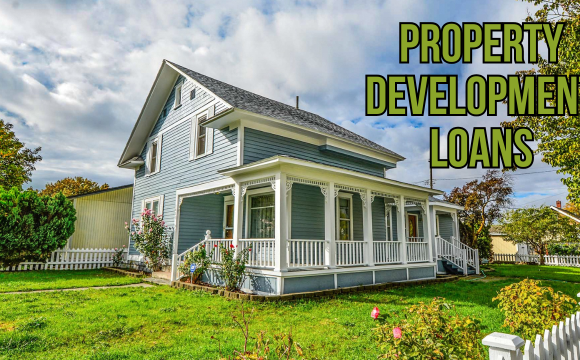Commercial property loans might sound like financial jargon to some, but they’re the keys to unlocking your investment dreams! If you’ve ever thought about diving into the world of commercial real estate, you’re not alone. A growing number of investors are seeing the value of these loans, not just as a way to acquire space for their business operations but also as a strategic investment tool. But before you plunge into the property pool, let’s break down the ins and outs of commercial property loans. And remember, while the journey may have its bumps, think of it as a roller-coaster ride—thrilling, full of ups and downs, and thankfully, requiring only minimal screaming!
Understanding Commercial Property Loans
What is a Commercial Property Loan?
A commercial property loan is a mortgage specifically designed for funding properties utilized for business purposes. Whether it’s an office space, a retail location, or a multi-family dwelling, these loans help finance the acquisition of real estate that generates income. Unlike a residential mortgage, which is tailored towards homeowners, commercial loans consider the potential rental income of a property.
Key Differences Between Commercial and Residential Loans
While they may seem similar, commercial and residential loans differ in several key areas. For starters, commercial property loans typically have shorter terms, ranging from five to twenty years, whereas residential loans often extend up to thirty years. Furthermore, the interest rates on commercial loans tend to be higher due to the increased risk seen by lenders. And let’s not forget—commercial loans generally require a more significant down payment, often between 20% to 30% of the purchase price.
Why Businesses Need Commercial Property Loans
Businesses often need these loans to expand their operations, relocate to larger premises, or invest in income-producing properties. They provide the opportunity to establish a foothold in the market, all while taking advantage of potential property appreciation. Plus, owning commercial property can add credibility to your business. Imagine clients walking into a sleek office rather than your basement; credibility boost guaranteed!
Types of Commercial Property Loans
Traditional Loans and Their Pros and Cons
Traditional loans offer a stable financing option for commercial property purchases. These mortgages are typically issued by banks and credit unions based on the borrower’s creditworthiness and the property’s cash flow potential. Although they can provide lower interest rates, they often come with more stringent qualification requirements.
SBA Loans: What They Are and How They Can Help
The Small Business Administration (SBA) offers loan programs specifically designed to assist small businesses in obtaining financing. These loans are backed by the SBA and typically come with lower down payment requirements compared to traditional loans. They’re a great option for aspiring property owners who might not have the hefty down payment usually expected.
Bridge Loans: The Quick Fix for Immediate Needs
Bridge loans are short-term loans that act as temporary financing until a permanent mortgage can be secured. They provide a quick influx of cash, making them ideal for investors looking to act fast. Just remember, bridge loans often come with higher interest rates, so use them wisely (think of it as a short-term band-aid for your cash flow).
Hard Money Loans: Risky Business or Opportunity?
Hard money loans are backed by the value of the property itself rather than the borrower’s creditworthiness. This enables faster access to funds, albeit with a catch—higher interest rates and shorter repayment terms. They can be beneficial for seasoned investors looking to flip properties or engage in fast transactions, but might have you sweating bullets if you miscalculate your flipping timeline.
Construction Loans: Building Your Future, One Brick at a Time
Construction loans are designed for financing the building of commercial properties. They provide capital based on the estimated value of the property once construction is complete. While these loans can be complex, they offer a pathway to bringing your dream property to life. Just be prepared for a few more hurdles than a race against time!
The Application Process: Don’t Get Lost in the Paperwork Maze
Pre-qualification vs. Pre-approval: What’s the Difference?
Before you start shopping for commercial properties, it’s essential to understand the difference between pre-qualification and pre-approval. Pre-qualification is a quick and informal process where a lender evaluates your financial health based on your self-reported income and debts. Think of it as a friendly chat at the coffee shop—informal and somewhat helpful, but lacking firm commitment. In contrast, pre-approval involves a thorough assessment of your financial history, credit score, and assets. It’s like getting a VIP badge for your property journey—showing sellers that you’re serious and financially capable.
Essential Documents for a Smooth Sail
Preparing your documents is like packing for a vacation—you’ll need your essentials! Here’s a list of some documentation required for a commercial loan application:
- Personal financial statement (your financial resume)
- Business tax returns (showing how well your business has been doing)
- Business plan (imagine selling a dream, but with numbers)
- Property information (details about the property you wish to buy)
- Proof of income (to demonstrate your earning potential)
Ensuring you have these documents ready will smooth the application process. No one likes a surprise audit, especially when you thought you were going to relax at the beach!
How to Prepare Your Finances Like a Pro (or a Superhero)
Cleaning up your finances is like clearing the clutter from your closet—the payoff is worth it. Start by checking your credit score and rectifying any inaccuracies. Paying down debts should be your priority. Additionally, having a solid plan on how you plan to use the loan and manage the property will impress lenders. It’s all about showing them that you’re a responsible superhero, ready to save the day!
Interest Rates and Terms: The Numbers Game
Understanding Interest Rates: Fixed vs. Variable
When it comes to interest rates, knowledge is power! A fixed interest rate remains constant throughout the life of the loan, making it easier to budget. On the other hand, variable rates can fluctuate, offering the potential for lower initial costs but also the risk of increased payments later on. Choosing wisely is crucial—doing your best impression of a personal finance guru can help you select the most beneficial option.
What’s a Loan Term, and Why Does It Matter?
The loan term refers to the amount of time you have to repay the loan. While longer terms result in lower monthly payments, they typically come with higher interest costs over time. Shorter terms mean higher monthly payments, but less paid in interest overall. Finding the right balance is like composing a song—ensure all the elements harmonize beautifully.
Tips for Securing the Best Rates (Spoiler: It Involves Research!)
To snag the best interest rates, start by shopping around. Different lenders have various criteria and rates. Ideally, you want to foster relationships with banks or lenders who specialize in commercial loans—they may offer competitive rates or better terms. Additionally, maintaining a strong credit score will help you shine like a diamond in a sea of pebbles.
Down Payments: The Show Me the Money Moment
Typical Down Payment Requirements
When it comes to down payments for commercial property loans, expect to fork out between 20% to 30% of the property value. This hefty amount is necessary because it demonstrates your investment-level commitment. Lenders view this as a buffer against financial risk, offering them comfort when giving you that cash!
How to Budget for Your Down Payment Without Selling a Kidney
Setting aside funds for your down payment can feel daunting, but with a solid plan, it’s achievable! Start by reviewing your current expenses and identifying areas where you can cut back. Consider setting up a dedicated savings account for your down payment. You can even get creative—think about side gigs or investments that can boost your savings. Just don’t go selling your kidneys; there are better options!
Alternatives to High Down Payments
If the thought of a heavy down payment makes you break out in a sweat, consider alternative financing options. Some lenders may offer loans with lower down payment requirements, particularly for certain SBA loans. Additionally, you can explore partnerships or joint ventures where multiple investors pool their resources. Teaming up is not just for superhero movies—it’s an effective strategy in the property world!
Credit Score: The Golden Ticket
Why Credit Scores Matter in the Loan Process
Your credit score is like your financial report card, and lenders scrutinize it closely when considering your loan application. A high score can help you qualify for lower interest rates and better terms, while a low score might restrict your options. Think of it as a backstage pass; the better your score, the more opportunities you have!
Tips for Improving Your Credit Score (Without Sacrificing Your Morning Coffee!)
Improving your credit score doesn’t have to involve extreme measures. Start by making timely payments, reducing your debt-to-income ratio, and checking your credit report for errors. Gradually increasing your credit limit (while avoiding additional debts) can also help. These small steps make a significant difference—consider it like a DIY project for your finances!
Common Credit Pitfalls to Avoid
Maintaining a healthy credit score means avoiding common pitfalls. Late payments, maxed-out credit cards, and applying for multiple loans at once can all negatively impact your score. Make sure to stay informed and proactive—it’s your mission to keep those credit dragons at bay!
Choosing the Right Lender: Not All Heroes Wear Capes
Different Types of Lenders and Who They Serve
Lenders come in many shapes and sizes—each specializing in different financing options. Some may be traditional banks offering conventional loans, while others could be online lenders specializing in fast financing or private lenders for hard money loans. Research is crucial here, as you want a lender tailored to your needs. Do you need flexibility or speedy service? The choice is yours!
Key Factors in Choosing the Right Lender for Your Needs
When evaluating lenders, consider factors like rates, terms, fees, and customer service. Online reviews and personal referrals can provide insight into a lender’s reliability. Find someone you can communicate with easily—after all, open dialogue is vital for a healthy, long-lasting relationship.
Questions to Ask Potential Lenders
When interviewing lenders, ask about their experience with commercial property loans, turnaround times, and the application process. Don’t hesitate to inquire about hidden fees or penalties. And remember to throw in a light question, like their favorited pizza topping—it breaks the ice and gives you a peek into their personality!
The Role of Commercial Appraisals
What is a Commercial Appraisal and Why Should You Care?
A commercial appraisal is an assessment of the property’s value, conducted by a qualified appraiser. Lenders require this to ensure they’re not lending more than the property is worth. Think of it as a reality check—nobody wants to overpay!
How Appraisals Affect Your Loan Amount
The appraisal value can significantly impact how much you can borrow. If the appraised value is lower than anticipated, you may have to reconsider your offer or come up with a larger down payment. Talk about a curveball! Being prepared for such situations can minimize potential heartaches.
Tips for Selecting a Good Appraiser
Choosing a qualified appraiser is key. Look for professionals with experience specifically in commercial properties. Check their credentials, read reviews, and don’t shy away from asking for referrals. It’s about getting the best assessment before you commit to your investment
Conditions of the Loan: Read the Fine Print!
Common Conditions You Might Encounter
When it comes to commercial property loans, ‘conditions’ are the rules of the game that you must follow. Common conditions include maintaining adequate insurance on the property, keeping financial records organized, and ensuring property maintenance standards. It’s essentially your lender’s way of ensuring you’re being responsible, kind of like a parent setting ground rules!
The Importance of Understanding Covenants
Covenants are legally binding promises that dictate what you can or cannot do with the property. They could range from restrictions on property use (like not turning your office into a pet daycare) to obligations to maintain property value. Understanding these covenants is crucial—violating them could lead to costly repercussions, including being forced to refinance under less favorable conditions.
What Happens If You Violate a Condition?
If you happen to violate a loan condition, the lender may impose penalties. These could involve increased interest rates or even a call for immediate repayment of the loan. Yes, that’s right—an angry lender can play hardball, so tread carefully! Always review and clarify any conditions before signing on the dotted line. Communication is key!
The Closing Process: The Final Countdown
What to Expect at Closing
Closing day can feel like the final level of a video game—exciting but fraught with potential challenges. You’ll be required to sign a mountain of paperwork, transfer funds, and finalize your mortgage details. It’s an exhilarating flurry of activity that ultimately leads to the triumphant moment when you finally hold the keys to your commercial property!
Common Closing Costs and How to Prepare for Them
Closing costs can range from 2% to 5% of the loan amount, so it’s essential to budget accordingly. Anticipate expenses such as appraisal fees, title insurance, loan origination fees, and attorney fees. Adequate preparation means there will be fewer surprises—think of it as packing snacks for a road trip!
Celebrate! But Don’t Forget the Cake and Confetti (And Keep Your Eye on the Documents!)
Once the papers are signed and funds exchanged, it’s time to celebrate! Just ensure that celebrating doesn’t cloud your judgment—review final documents one last time. And while you enjoy the cake, remember that now the real fun begins—managing your investment!
Post-Loan Management: Keeping Your Investment Afloat
Tips for Managing Your Property and Loan Effectively
Managing a commercial property means staying organized and proactive. Conduct regular property inspections and keep a close eye on your cash flow. Set aside funds for repairs and unexpected costs to prevent any financial hiccups. If you can, consider hiring a property management team—they’re like having a pit crew for your investment!
The Importance of Bookkeeping and Financial Reporting
Bookkeeping might sound dull, but it’s crucial for your financial health. Accurate record-keeping can help you track income, expenses, and profitability, allowing you to make informed decisions. Regular financial reporting also keeps you in sync with your investment goals. Think of it as keeping your investment ship sailing smoothly!
When to Consider Refinancing
Refinancing can be a powerful tool if you’re looking to reduce monthly payments, tap into equity, or switch to a better interest rate. Monitor the market rates regularly—if they dip, it might be time to go back to your lender and explore your refinancing options. Keeping your finger on the financial pulse pays off!
The Risks and Rewards of Commercial Property Loans
Understanding the Risks Involved in Property Investment
While commercial property can be a lucrative investment, it also comes with risks. Economic downturns can impact rental income, while property value fluctuations can affect your return on investment. Conduct thorough market research and have a contingency plan to mitigate these risks. It’s like checking the weather before you step out; preparation is everything!
Potential Rewards That Make It All Worthwhile
On the upside, commercial property investment can yield significant rewards—think steady rental income, property appreciation, and tax benefits. Building equity in a commercial property can also lead to future investment opportunities. The rewards may not come overnight, but with patience and perseverance, the fruits of your labor can be plentiful.
A Humorous Look at “Property Horror Stories”
Every seasoned investor has a property horror story—be it dealing with a leaky roof in a new property or tenants who think “party” means 2 a.m. on a Wednesday. Laughing about these experiences helps normalize the ups and downs of property investment. After all, they make for fantastic storytelling at dinner parties!
Trends in Commercial Property Financing
Current Trends Shaping the Market
The commercial property landscape is constantly evolving. Many investors now consider eco-friendly buildings and sustainability as key factors in property valuation. Additionally, the push towards remote work has shifted demand from traditional office spaces to flexible arrangements, influencing lending practices.
The Rise of Digital Lending Solutions
With technology at the forefront, digital lending platforms are gaining traction. These platforms streamline the application and approval processes, making obtaining financing quicker and more accessible. As the saying goes, “If you can’t beat them, join them!” Being digital-savvy might just make your loan process smoother than ever.
Sustainability in Commercial Properties: A Growing Focus
Investing in green buildings and sustainable practices can enhance property value and improve cash flow. Many lenders now offer better terms for properties that meet sustainability standards. Plus, it’s a great conversation starter—who wouldn’t want to brag about their eco-friendly building?
Conclusion: Taking the Leap into Commercial Property Investment
In the world of commercial property loans, knowledge is your best friend. From understanding the application process to managing your investment, being informed can make all the difference. So as you stand at the precipice of your investment journey, take a deep breath, grab that key, and unlock the doors to your future ventures.
Your Move!
Feeling inspired? Consult with a financial advisor or a mortgage professional to determine your best path forward. And don’t hesitate to share your experiences or questions in the comments section below; after all, every question is a chance to learn! Remember, even the most successful property investors started just like you—one step at a time. So go ahead, take that leap! Who knows, you might just end up becoming the next commercial property mogul, cape optional!
Unlocking the Door to Your Investment Dreams
Commercial property loans might sound like financial jargon to some, but they’re the keys to unlocking your investment dreams! If you’ve ever thought about diving into the world of commercial real estate, you’re not alone. A growing number of investors are seeing the value of these loans, not just as a way to acquire space for their business operations but also as a strategic investment tool. But before you plunge into the property pool, let’s break down the ins and outs of commercial property loans. And remember, while the journey may have its bumps, think of it as a roller-coaster ride—thrilling, full of ups and downs, and thankfully, requiring only minimal screaming!
Understanding Commercial Property Loans
What is a Commercial Property Loan?
A commercial property loan is a mortgage specifically designed for funding properties utilized for business purposes. Whether it’s an office space, a retail location, or a multi-family dwelling, these loans help finance the acquisition of real estate that generates income. Unlike a residential mortgage, which is tailored towards homeowners, commercial loans consider the potential rental income of a property.
Key Differences Between Commercial and Residential Loans
While they may seem similar, commercial and residential loans differ in several key areas. For starters, commercial property loans typically have shorter terms, ranging from five to twenty years, whereas residential loans often extend up to thirty years. Furthermore, the interest rates on commercial loans tend to be higher due to the increased risk seen by lenders. And let’s not forget—commercial loans generally require a more significant down payment, often between 20% to 30% of the purchase price.
Why Businesses Need Commercial Property Loans
Businesses often need these loans to expand their operations, relocate to larger premises, or invest in income-producing properties. They provide the opportunity to establish a foothold in the market, all while taking advantage of potential property appreciation. Plus, owning commercial property can add credibility to your business. Imagine clients walking into a sleek office rather than your basement; credibility boost guaranteed!
Types of Commercial Property Loans
Traditional Loans and Their Pros and Cons
Traditional loans offer a stable financing option for commercial property purchases. These mortgages are typically issued by banks and credit unions based on the borrower’s creditworthiness and the property’s cash flow potential. Although they can provide lower interest rates, they often come with more stringent qualification requirements.
SBA Loans: What They Are and How They Can Help
The Small Business Administration (SBA) offers loan programs specifically designed to assist small businesses in obtaining financing. These loans are backed by the SBA and typically come with lower down payment requirements compared to traditional loans. They’re a great option for aspiring property owners who might not have the hefty down payment usually expected.
Bridge Loans: The Quick Fix for Immediate Needs
Bridge loans are short-term loans that act as temporary financing until a permanent mortgage can be secured. They provide a quick influx of cash, making them ideal for investors looking to act fast. Just remember, bridge loans often come with higher interest rates, so use them wisely (think of it as a short-term band-aid for your cash flow).
Hard Money Loans: Risky Business or Opportunity?
Hard money loans are backed by the value of the property itself rather than the borrower’s creditworthiness. This enables faster access to funds, albeit with a catch—higher interest rates and shorter repayment terms. They can be beneficial for seasoned investors looking to flip properties or engage in fast transactions, but might have you sweating bullets if you miscalculate your flipping timeline.
Construction Loans: Building Your Future, One Brick at a Time
Construction loans are designed for financing the building of commercial properties. They provide capital based on the estimated value of the property once construction is complete. While these loans can be complex, they offer a pathway to bringing your dream property to life. Just be prepared for a few more hurdles than a race against time!
The Application Process: Don’t Get Lost in the Paperwork Maze
Pre-qualification vs. Pre-approval: What’s the Difference?
Before you start shopping for commercial properties, it’s essential to understand the difference between pre-qualification and pre-approval. Pre-qualification is a quick and informal process where a lender evaluates your financial health based on your self-reported income and debts. Think of it as a friendly chat at the coffee shop—informal and somewhat helpful, but lacking firm commitment. In contrast, pre-approval involves a thorough assessment of your financial history, credit score, and assets. It’s like getting a VIP badge for your property journey—showing sellers that you’re serious and financially capable.
Essential Documents for a Smooth Sail
Preparing your documents is like packing for a vacation—you’ll need your essentials! Here’s a list of some documentation required for a commercial loan application:
- Personal financial statement (your financial resume)
- Business tax returns (showing how well your business has been doing)
- Business plan (imagine selling a dream, but with numbers)
- Property information (details about the property you wish to buy)
- Proof of income (to demonstrate your earning potential)
Ensuring you have these documents ready will smooth the application process. No one likes a surprise audit, especially when you thought you were going to relax at the beach!
How to Prepare Your Finances Like a Pro (or a Superhero)
Cleaning up your finances is like clearing the clutter from your closet—the payoff is worth it. Start by checking your credit score and rectifying any inaccuracies. Paying down debts should be your priority. Additionally, having a solid plan on how you plan to use the loan and manage the property will impress lenders. It’s all about showing them that you’re a responsible superhero, ready to save the day!
Interest Rates and Terms: The Numbers Game
Understanding Interest Rates: Fixed vs. Variable
When it comes to interest rates, knowledge is power! A fixed interest rate remains constant throughout the life of the loan, making it easier to budget. On the other hand, variable rates can fluctuate, offering the potential for lower initial costs but also the risk of increased payments later on. Choosing wisely is crucial—doing your best impression of a personal finance guru can help you select the most beneficial option.
What’s a Loan Term, and Why Does It Matter?
The loan term refers to the amount of time you have to repay the loan. While longer terms result in lower monthly payments, they typically come with higher interest costs over time. Shorter terms mean higher monthly payments, but less paid in interest overall. Finding the right balance is like composing a song—ensure all the elements harmonize beautifully.
Tips for Securing the Best Rates (Spoiler: It Involves Research!)
To snag the best interest rates, start by shopping around. Different lenders have various criteria and rates. Ideally, you want to foster relationships with banks or lenders who specialize in commercial loans—they may offer competitive rates or better terms. Additionally, maintaining a strong credit score will help you shine like a diamond in a sea of pebbles.
Down Payments: The Show Me the Money Moment
Typical Down Payment Requirements
When it comes to down payments for commercial property loans, expect to fork out between 20% to 30% of the property value. This hefty amount is necessary because it demonstrates your investment-level commitment. Lenders view this as a buffer against financial risk, offering them comfort when giving you that cash!
How to Budget for Your Down Payment Without Selling a Kidney
Setting aside funds for your down payment can feel daunting, but with a solid plan, it’s achievable! Start by reviewing your current expenses and identifying areas where you can cut back. Consider setting up a dedicated savings account for your down payment. You can even get creative—think about side gigs or investments that can boost your savings. Just don’t go selling your kidneys; there are better options!
Alternatives to High Down Payments
If the thought of a heavy down payment makes you break out in a sweat, consider alternative financing options. Some lenders may offer loans with lower down payment requirements, particularly for certain SBA loans. Additionally, you can explore partnerships or joint ventures where multiple investors pool their resources. Teaming up is not just for superhero movies—it’s an effective strategy in the property world!
Credit Score: The Golden Ticket
Why Credit Scores Matter in the Loan Process
Your credit score is like your financial report card, and lenders scrutinize it closely when considering your loan application. A high score can help you qualify for lower interest rates and better terms, while a low score might restrict your options. Think of it as a backstage pass; the better your score, the more opportunities you have!
Tips for Improving Your Credit Score (Without Sacrificing Your Morning Coffee!)
Improving your credit score doesn’t have to involve extreme measures. Start by making timely payments, reducing your debt-to-income ratio, and checking your credit report for errors. Gradually increasing your credit limit (while avoiding additional debts) can also help. These small steps make a significant difference—consider it like a DIY project for your finances!
Common Credit Pitfalls to Avoid
Maintaining a healthy credit score means avoiding common pitfalls. Late payments, maxed-out credit cards, and applying for multiple loans at once can all negatively impact your score. Make sure to stay informed and proactive—it’s your mission to keep those credit dragons at bay!
Choosing the Right Lender: Not All Heroes Wear Capes
Different Types of Lenders and Who They Serve
Lenders come in many shapes and sizes—each specializing in different financing options. Some may be traditional banks offering conventional loans, while others could be online lenders specializing in fast financing or private lenders for hard money loans. Research is crucial here, as you want a lender tailored to your needs. Do you need flexibility or speedy service? The choice is yours!
Key Factors in Choosing the Right Lender for Your Needs
When evaluating lenders, consider factors like rates, terms, fees, and customer service. Online reviews and personal referrals can provide insight into a lender’s reliability. Find someone you can communicate with easily—after all, open dialogue is vital for a healthy, long-lasting relationship.
Questions to Ask Potential Lenders
When interviewing lenders, ask about their experience with commercial property loans, turnaround times, and the application process. Don’t hesitate to inquire about hidden fees or penalties. And remember to throw in a light question, like their favorited pizza topping—it breaks the ice and gives you a peek into their personality!
The Role of Commercial Appraisals
What is a Commercial Appraisal and Why Should You Care?
A commercial appraisal is an assessment of the property’s value, conducted by a qualified appraiser. Lenders require this to ensure they’re not lending more than the property is worth. Think of it as a reality check—nobody wants to overpay!
How Appraisals Affect Your Loan Amount
The appraisal value can significantly impact how much you can borrow. If the appraised value is lower than anticipated, you may have to reconsider your offer or come up with a larger down payment. Talk about a curveball! Being prepared for such situations can minimize potential heartaches.
Tips for Selecting a Good Appraiser
Choosing a qualified appraiser is key. Look for professionals with experience specifically in commercial properties. Check their credentials, read reviews, and don’t shy away from asking for referrals. It’s about getting the best assessment before you commit to your investment
Conditions of the Loan: Read the Fine Print!
Common Conditions You Might Encounter
When it comes to commercial property loans, ‘conditions’ are the rules of the game that you must follow. Common conditions include maintaining adequate insurance on the property, keeping financial records organized, and ensuring property maintenance standards. It’s essentially your lender’s way of ensuring you’re being responsible, kind of like a parent setting ground rules!
The Importance of Understanding Covenants
Covenants are legally binding promises that dictate what you can or cannot do with the property. They could range from restrictions on property use (like not turning your office into a pet daycare) to obligations to maintain property value. Understanding these covenants is crucial—violating them could lead to costly repercussions, including being forced to refinance under less favorable conditions.
What Happens If You Violate a Condition?
If you happen to violate a loan condition, the lender may impose penalties. These could involve increased interest rates or even a call for immediate repayment of the loan. Yes, that’s right—an angry lender can play hardball, so tread carefully! Always review and clarify any conditions before signing on the dotted line. Communication is key!
The Closing Process: The Final Countdown
What to Expect at Closing
Closing day can feel like the final level of a video game—exciting but fraught with potential challenges. You’ll be required to sign a mountain of paperwork, transfer funds, and finalize your mortgage details. It’s an exhilarating flurry of activity that ultimately leads to the triumphant moment when you finally hold the keys to your commercial property!
Common Closing Costs and How to Prepare for Them
Closing costs can range from 2% to 5% of the loan amount, so it’s essential to budget accordingly. Anticipate expenses such as appraisal fees, title insurance, loan origination fees, and attorney fees. Adequate preparation means there will be fewer surprises—think of it as packing snacks for a road trip!
Celebrate! But Don’t Forget the Cake and Confetti (And Keep Your Eye on the Documents!)
Once the papers are signed and funds exchanged, it’s time to celebrate! Just ensure that celebrating doesn’t cloud your judgment—review final documents one last time. And while you enjoy the cake, remember that now the real fun begins—managing your investment!
Post-Loan Management: Keeping Your Investment Afloat
Tips for Managing Your Property and Loan Effectively
Managing a commercial property means staying organized and proactive. Conduct regular property inspections and keep a close eye on your cash flow. Set aside funds for repairs and unexpected costs to prevent any financial hiccups. If you can, consider hiring a property management team—they’re like having a pit crew for your investment!
The Importance of Bookkeeping and Financial Reporting
Bookkeeping might sound dull, but it’s crucial for your financial health. Accurate record-keeping can help you track income, expenses, and profitability, allowing you to make informed decisions. Regular financial reporting also keeps you in sync with your investment goals. Think of it as keeping your investment ship sailing smoothly!
When to Consider Refinancing
Refinancing can be a powerful tool if you’re looking to reduce monthly payments, tap into equity, or switch to a better interest rate. Monitor the market rates regularly—if they dip, it might be time to go back to your lender and explore your refinancing options. Keeping your finger on the financial pulse pays off!
The Risks and Rewards of Commercial Property Loans
Understanding the Risks Involved in Property Investment
While commercial property can be a lucrative investment, it also comes with risks. Economic downturns can impact rental income, while property value fluctuations can affect your return on investment. Conduct thorough market research and have a contingency plan to mitigate these risks. It’s like checking the weather before you step out; preparation is everything!
Potential Rewards That Make It All Worthwhile
On the upside, commercial property investment can yield significant rewards—think steady rental income, property appreciation, and tax benefits. Building equity in a commercial property can also lead to future investment opportunities. The rewards may not come overnight, but with patience and perseverance, the fruits of your labor can be plentiful.
A Humorous Look at “Property Horror Stories”
Every seasoned investor has a property horror story—be it dealing with a leaky roof in a new property or tenants who think “party” means 2 a.m. on a Wednesday. Laughing about these experiences helps normalize the ups and downs of property investment. After all, they make for fantastic storytelling at dinner parties!
Trends in Commercial Property Financing
Current Trends Shaping the Market
The commercial property landscape is constantly evolving. Many investors now consider eco-friendly buildings and sustainability as key factors in property valuation. Additionally, the push towards remote work has shifted demand from traditional office spaces to flexible arrangements, influencing lending practices.
The Rise of Digital Lending Solutions
With technology at the forefront, digital lending platforms are gaining traction. These platforms streamline the application and approval processes, making obtaining financing quicker and more accessible. As the saying goes, “If you can’t beat them, join them!” Being digital-savvy might just make your loan process smoother than ever.
Sustainability in Commercial Properties: A Growing Focus
Investing in green buildings and sustainable practices can enhance property value and improve cash flow. Many lenders now offer better terms for properties that meet sustainability standards. Plus, it’s a great conversation starter—who wouldn’t want to brag about their eco-friendly building?
Conclusion: Taking the Leap into Commercial Property Investment
In the world of commercial property loans, knowledge is your best friend. From understanding the application process to managing your investment, being informed can make all the difference. So as you stand at the precipice of your investment journey, take a deep breath, grab that key, and unlock the doors to your future ventures.
Your Move!
Feeling inspired? Consult with a financial advisor or a mortgage professional to determine your best path forward. And don’t hesitate to share your experiences or questions in the comments section below; after all, every question is a chance to learn! Remember, even the most successful property investors started just like you—one step at a time. So go ahead, take that leap! Who knows, you might just end up becoming the next commercial property mogul, cape optional!







